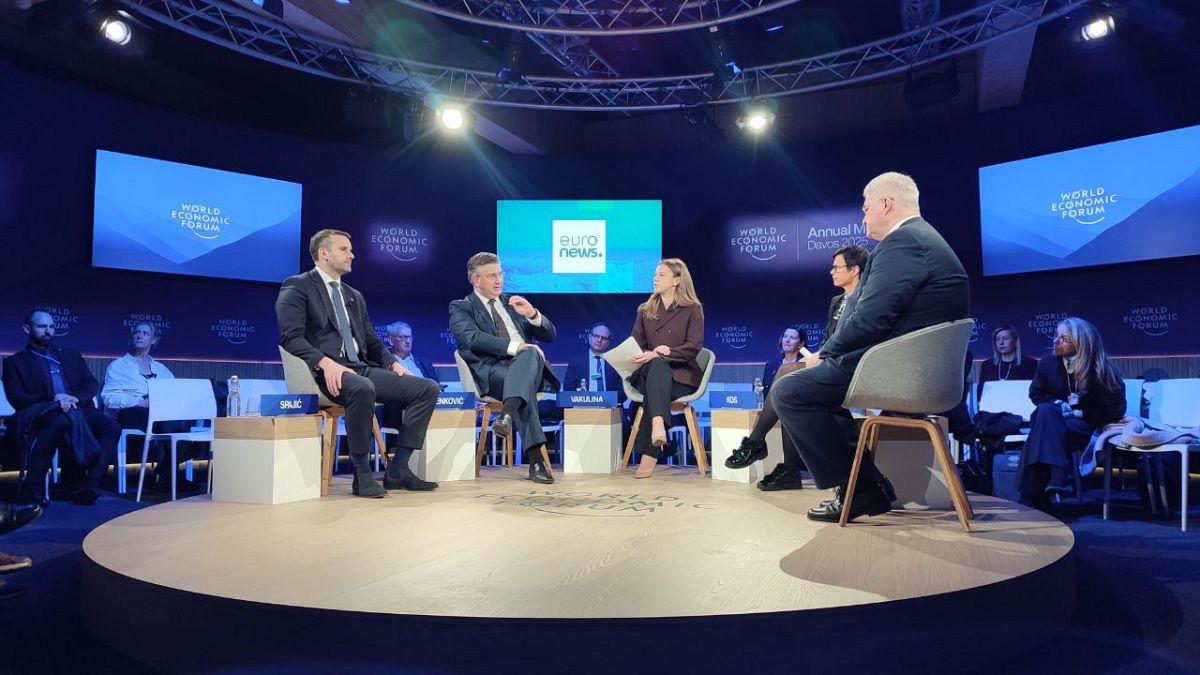EU must plan funds for new members in next budget: Ukrainian minister

In a Euronews-moderated debate in Davos, Ukraine’s foreign minister called on the bloc to put its money where its mouth is on enlargement, insisting that Ukraine’s membership will not be costly for the other member states.
If the EU is serious about enlargement, its next multi-annual budget for the period ending in 2034 must include money for new members, Ukraine’s foreign minister said on Wednesday.
The 27-country bloc must treat candidate countries “now as members of EU”, Andrii Sybiha said during a discussion on the sidelines of the World Economic Forum in Davos led by Euronews reporter Sasha Vakulina.
“When we are speaking for example about the budget of 2028-2034, of course it would be great if, in this budget, this ambitious goal of huge enlargement should be reflected – because without this it will be really problematic to fulfill,” he said.
Negotiations over the EU’s next trillion-euro Multiannual Financial Framework (MFF) are scheduled to start in the summer.
Ukraine is among nine candidate countries at varying stages of the accession process. Montenegro and Albania are far enough advanced to have said they are confident of becoming fully fledged members before the end of the decade.
Ukraine, Moldova, and Georgia all applied in the days following Russia’s full-scale invasion of Ukraine and were granted candidate status in record time as member states reacted to the new geopolitical reality by placing enlargement back at the top of the bloc’s agenda. Negotiations with Kyiv and Chisinau started in 2024.
The Ukrainian minister emphasised that the EU is “not doing a favour for us” because his war-torn country “will contribute to the strength of the EU” thanks to its experience on the battlefield, and its technology and defence industries.
“The cost will be approximately 0.17% of the EU’s GDP, if we are speaking about the enlargement of nine countries,” he said.
Speaking on a panel that included EU Commissioner for enlargement Marta Kos, Croatian Prime Minister Andrej Plenković and Montenegrin Prime Minister Milojko Spajić, Sybiha said his country aimed to open “at least two clusters” of negotiations in 2025 under the Polish and Danish presidencies of the EU Council.
According to Kos, Poland and Denmark could helm “the best presidencies when we speak about enlargement”.
“In this year, technically we could have 20 intergovernmental conferences (rounds of negotiations)” with candidate countries, the EU commissioner said.
The EU executive and member states have repeatedly said over the past three years that enlargement is a “merit-based” process, but each step remains highly political and must be unanimously approved by the existing member states.
Despite this, Plenković stressed that he hasn’t “seen such a positive attitude about enlargement for a very long time” from heads of state and government.
The Croatian premier acknowledged, however, that “budgetary implications” weigh on some on the minds of some leaders, and that the EU’s decision-making process and institutional architecture is “another elephant in the room”.
Spajić, whose country applied to join the EU back in 2008, dismissed any notion that candidate countries are competing with each other to join the bloc.
The Montenegrin premier also rejected the idea that the fast-tracking of Ukraine’s candidacy may have caused rancour among other membership hopefuls. “We love it,” Spajić said. “We want it even faster.”
“We’re all trying to fulfill the basic conditions,” he said. “It’s for ourselves, to develop better, to be a better market economy, to have rule of law.”
“I would say that we still need to keep some level of meritocracy,” he added. “If we are too lenient on this, I think the meritocratic approach of changing institutions is also going to be impaired a little bit.”
Montenegro’s plan is unchanged: to conclude negotiations by the end of 2026 so that “in 2028, we become the 28th member state”, Spajić said.
Rewatch the debate on Euronews in the player above.
Related
A New Book Argues That What Happens in Europe Doesn’t…
Remaking the World: European Distinctiveness and the Transformation of Politics, Culture, and the Economy by Jerrold Seigel “No issue in world
Poland plans military training for every adult male amid growing…
Poland’s prime minister, Donald Tusk, has said his government is working on a plan to prepare large-scale military training for every adult male in response t
2025 European Athletics Indoor Championships: Ditaji Kambundji secures women’s 60m…
Switzerland’s Ditaji Kambundji walked away from the 2025 European Athletics Indoor Championships in Apeldoorn on 7 March with much more than her first Europea
Takeaways from the EU’s landmark security summit after Trump said…
BRUSSELS (AP) — European Union leaders are trumpeting their endorsement of a plan to free up hundreds of billions of








